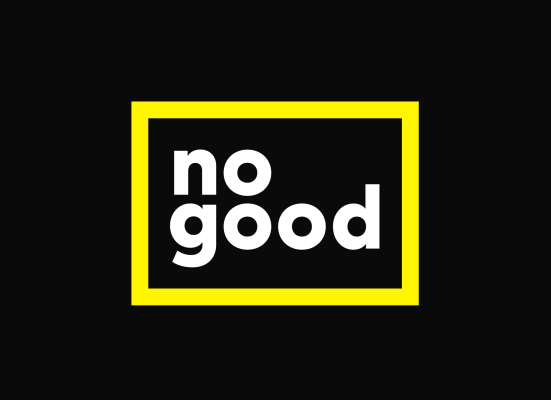NoGood CEO Mostafa Elbermawy describes how they evaluate a client’s growth challenges by quoting Zen teacher Hunryu Suzuki: “In the beginner’s mind there are many possibilities; in the expert’s mind there are only a few.” Rather than deferring to in-house playbooks, NoGood adopts an open mind combined with a methodical, data-driven approach to find untapped growth opportunities for its clients. Learn more about how NoGood came to be and why they’re willing to say no to potential clients.
On NoGood’s approach to growth:
“Our work is methodical. It’s intentional. We have to talk about it. We are very transparent about what we do and it’s completely process oriented. Hacking is a misnomer. Growth is not about clever shortcuts. It has to be sustainable and repeatable, and if it’s not, we won’t do it.”
On NoGood’s proudest accomplishment:
“They helped us launch our business. They are our CMO and our CTO. Would recommend to anyone.” Erica Tsypin, Washington D.C., Co-Founder & COO, Steer
“Our success in jumpstarting Steer’s business is one of our proudest accomplishments this year. Steer is an electric car subscription startup that asked us to increase their activations. Basically, our job was to generate new active members, which not only meant encouraging more users to download the app, upload a license, and get approved, but it also meant delivering a car to a member’s door, having them drive that car and leaving a review. We were able to demonstrate signup traction for Steer and help them launch in under three months.”
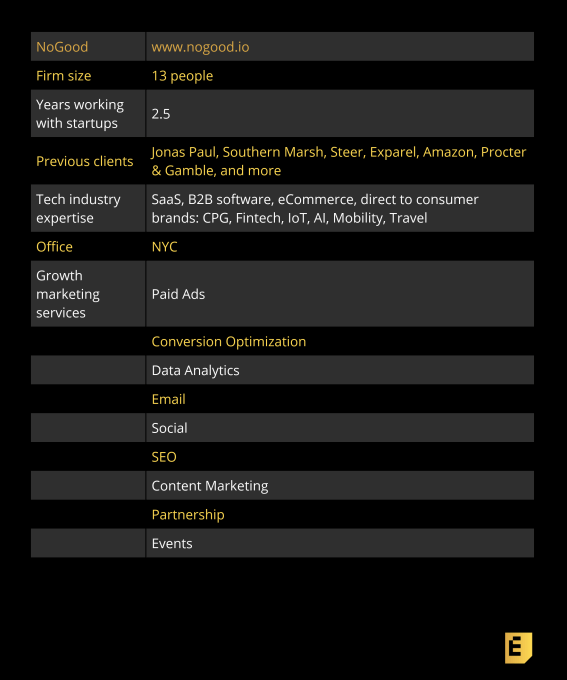
Below, you’ll find the rest of the founder reviews, the full interview, and more details like pricing and fee structures. This profile is part of our ongoing series covering startup growth marketing agencies with whom founders love to work, based on this survey and our own research. The survey is open indefinitely, so please fill it out if you haven’t already.
Interview with NoGood CEO and Growth Lead Mostafa Elbermawy
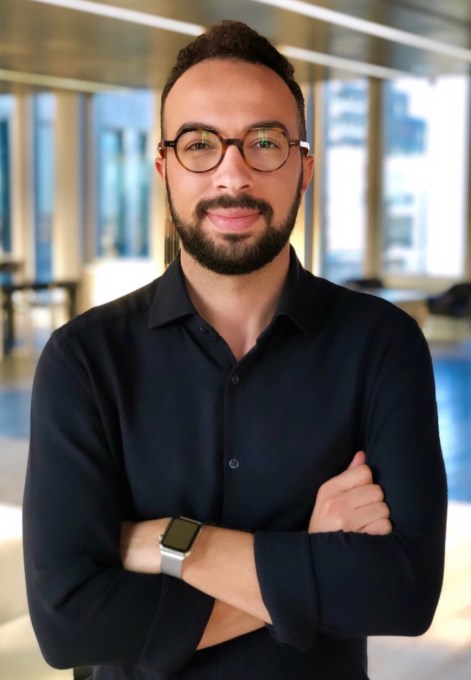
Yvonne Leow: To kick things off, how did you get into growth?
Mostafa Elbermawy: Well, I went to school for archaeology, but hieroglyphics weren’t paying the bills, so I taught myself how to code and started a web design studio after college. I started building websites for clients, and they started asking me how to drive more users to their sites to help grow their business.
I started tinkering with growth out of curiosity, and eventually joined the digital experience team at American Express. That job helped me gain some marketing and growth experience, and I ended up falling in love with that part of the job.
Since then, I’ve worked for a bunch of VC-backed tech startups. I was the director of digital marketing at CGS, a fashion software company in downtown Manhattan, the head of growth marketing for Harver, a global AI recruitment software startup, and a project management software startup called Workzone.
All of these companies were in very competitive markets so I was able to learn how to grow their products at scale. I later became a startup advisor for various incubators and accelerators to help founders define and understand their growth strategy.
A couple of years ago, a couple of startup founders asked me to help them with growth and I decided to help them as an agency. I hired the growth team I’ve always dreamed of and created what is now NoGood.
Yvonne Leow: What makes NoGood different from other growth marketing agencies?
Mostafa Elbermawy: We are highly methodical and data-driven and come with none of the classic agency fluff. We take a truly full-funnel approach to growth. We track the funnel down to the most meaningful metric, whether it’s user activation, revenue goals, or engagement.
Additionally, we approach every growth challenge with a beginner’s mindset. Most agencies have their standardized process and out of the box channel tactics. One of my favorite quotes is from Suzuki, “In the beginner’s mind there are many possibilities; in the expert’s mind there are only a few.” This approach to growth has helped us uncover massive growth opportunities for our clients and untapped areas their competitors haven’t discovered yet.
Another differentiator is that we don’t have a sales team. From day one, our clients work directly with our growth marketers, and vice-versa. Our process starts with a conversation. What does success mean to you as a business and how can we translate that success into measurable metrics? Clients often have a vague idea of what success looks like, but they don’t really have well-defined metrics. Our team helps them define both.
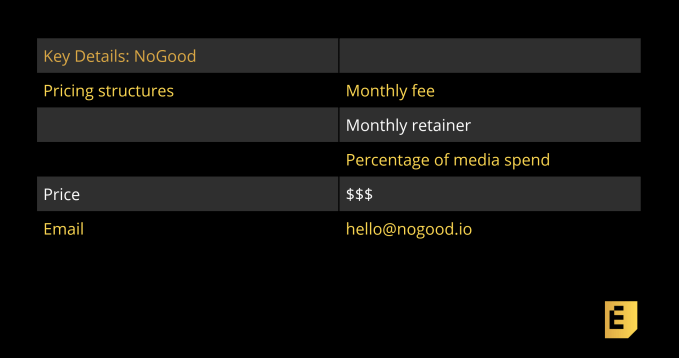
Yvonne Leow: How long is each engagement with a partner and what’s the process look like once you’ve agreed to work with a startup?
Mostafa Elbermawy: Generally, it depends on the stage of the startup. Our initial evaluations typically last between a few days up to a couple of weeks, and at that point I find there are typically two kinds of clients that have a slightly different process.
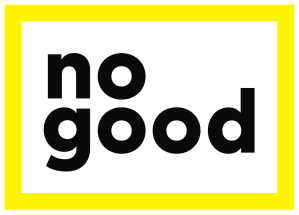 The first group is actively working on growth but struggling to hit their desired growth rates or maintain a healthy customer acquisition cost (CAC). The second group is gearing up for a product launch and is looking for a partner to help them rapidly experiment and find the most viable growth path.
The first group is actively working on growth but struggling to hit their desired growth rates or maintain a healthy customer acquisition cost (CAC). The second group is gearing up for a product launch and is looking for a partner to help them rapidly experiment and find the most viable growth path.
The first type has a valuable amount of historical data of what has or hasn’t worked, which we can leverage to develop better hypotheses and new ways to hit their targets. The second type of client requires more focus on experimentation, qualitative persona analysis, and competitive research to figure out a solid short- and long-term growth strategy.
Since we’ve done growth across various industries, we have some growth strategies that yield guaranteed results, but we prefer to approach each account with an open mindset. The goal is to optimize their growth rather than repeat the same tried and true strategies.
For example, for direct to consumer and eCommerce clients, we know that Facebook has been a key growth driver. For SaaS companies and software companies, we know that content marketing, search or account-based marketing (ABM) have been key growth channels for many clients.
In regards to our process, it typically starts with a friendly chat where we discuss current pains and what success looks like, then we analyze a historical data as well as your competition data and identify immediate growth opportunities to work on while getting up to speed and syncing up on long term growth strategy. During this process, we look at things such as existing MarTech stack, data hygiene, qualitative persona analysis, business and/or growth model.
Either way, essentially all of our partners start seeing results within the first three months. We aim to get new partners as many quick and early wins as possible, though we typically require a minimum of a six-month commitment to allow us to build a strong growth foothold with the right marketing mix.
Some of our partnerships will continue indefinitely, perhaps until they graduate into hiring their own in-house team, which we’ve even helped to train in the past. We also work with other partners on a narrower scope with a more limited engagement.
Yvonne Leow: Do you work with a lot of early-stage companies? What does your clientele look like?
Mostafa Elbermawy: Yes, we do work with various early-stage startups and corporate innovation teams. That being said, the majority of brands we work with are post-Series A startups or established enterprises that have strong traction, proof of product market fit and are ready to scale. We’re also looking for whether they have the ability to fulfill and deliver the product or service they are trying to grow and whether they have the media and agency retainer budget.
Sometimes we have discovery calls with early-stage founders where we honestly tell them whether it makes sense to partner with us. I don’t mind telling an entrepreneur “You know what?
Actually, it doesn’t make sense for you to hire us. You’re selling this software for X or you’re relying on this freemium model that you’re waiting for growth to happen at that stage, and I don’t think your runway or the money you’ve raised should actually be spent on a growth partner.”
Yvonne Leow: Relatedly, what is your payment structure for clients?
Mostafa Elbermawy: Like most agencies, we have a monthly retainer fee. The amount depends on the scope of the project. It often makes sense to structure our fee as a percentage of the company’s media spend and campaign performance. In addition to that, clients have to account for any content development, web design, creative work and development design work.
At the end of the day, we know that our pricing is going to impact our partners’ CAC. We know that our pricing has to make sense in the larger scheme of the client’s end goal so we structure our rates in a way that keeps both parties’ goals aligned.
Yvonne Leow: Got it. What is your proudest accomplishment for NoGood?
Mostafa Elbermawy: Our success in jumpstarting Steer’s business is one of our proudest accomplishments this year. Steer is an electric car subscription startup that asked us to increase their activations. Basically, our job was to generate new active members, which not only meant encouraging more users to download the app, upload a license, and get approved, but it also meant delivering a car to a member’s door, having them drive that car and leaving a review. We were able to demonstrate signup traction for Steer and help them launch in under three months.
Yvonne Leow: What were some mistakes you made early on at NoGood and what did you learn from them?
Mostafa Elbermawy: Oh, I made a lot of mistakes. One of the biggest mistakes I made was having an ambiguous scope of an engagement. I also took on clients who had a lot of passion, but who were trying to scale before they had clear product-market fit. As a founder, I want to help them, but that led to a lot of frustration for my team.
Yvonne Leow: Last question. What are some misconceptions about growth marketing that you would like to clarify?
Mostafa Elbermawy: The most popular one is around growth hacking. I think there is a notion or expectation that growth hackers do something different than what a traditional marketer would do. There are a lot of people who expect growth hackers to have a magic silver bullet.
I want to dispel the idea that we are working in some sort of a black box. At NoGood, we gravitate towards the term growth marketer. Our work is methodical. It’s intentional. We have to talk about it. We are very transparent about what we do and it’s completely process oriented.
Hacking is a misnomer. Growth is not about clever shortcuts. It has to be sustainable and repeatable, and if it’s not, we won’t do it. And lastly, as competition intensifies and technology evolves, growth marketing is increasingly important. I often think of the Warren Buffett quote that “only when the tide goes out do you discover who’s been swimming naked.” We’re prepared for the tidal shifts.
Founder Recommendations
“NoGood is highly methodical, experimental and data-driven in every sense of the word. It was eye-opening to me the type of change and impact we could drive using their approach and techniques. I was also surprised by how fast and detailed their work was compared to prior agency partners.” – Joshua Golden, Scottsdale, AZ, Senior Paid Digital Strategist and Analyst, WebPT
“They helped us launch our business. They are our CMO and our CTO. Would recommend to anyone.” – Erica Tsypin, Washington D.C., Founder & COO, Steer
“Data and analytics experts, very smart with website management/design/tracking implementation, social media, and PPC. They get right into the work without layers of fake middle management slowing things down and raising costs.” – Director of Paid Social in Miami Beach, FL
“They increased conversion rate by 4X and cut down acquisition cost by 70%.” – Russel Walters, Philadelphia, PA, CTO and Co-founder, Somn
“Maximized conversion and revenue.” – Director of Enterprise Sales in NYC
